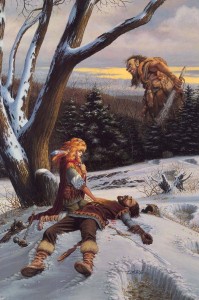While the Dungeon’s Master team enjoys some well-deserved vacation time, we’re breaking out the greatest hits and shining a spotlight on a few of our favourite articles from 2013. We’ve searched for hidden gems that our newer readers might have missed and our long-time readers will enjoy reading again. Enjoy a second look at these greatest hits from Dungeon’s Master.
Obviously there have been some changes to D&D Next since I wrote this article back in July. As was pointed out in the comments of the original article, there are healing powers at higher levels that do allow the Cleric to provide healing from a distance. But this article is more than a critique on a few powers in a beta version of D&D Next.
The reason I chose to include this article in the Greatest Hits this year was because I think players going from older editions of D&D (including 4e) to D&D Next need to realize that healing magic is special. In D&D Next it’s not as plentiful or commonplace as it was in 4e. Fewer classes can heal wounded PCs and there’s no Second Wind or other mechanic that allows everyone to just heal them self. The lesson here is that tactics must change as the rules change.
Too many players believe that they should run headlong into combat and throw consequences to the wind. They’ve played other version of D&D where the healer will swoop in, heal them, and keep them on their feet. Since that’s less likely to happen in D&D Next while the battle’s still raging on, using smart tactics is more important than ever before.
Players need to be more keenly aware of how many hit points their character has and how likely they are to lose them given each round the circumstances. In D&D Next there are fewer hit points per character per level (than 4e, anyway) which makes every fight life threatening. So as long as healing require an up close and personal interaction with a Cleric PCs should stay near the healer or make sure he can get to them easily.
From July 24, 2013, Dungeon’s Master once again presents: Making Healing Easier in D&D Next.
 Time heals all wounds. Unless you’re a PC in a fantasy role-playing game like D&D in which case there is plenty of healing magic at your disposal. Now divine spells and potions heal all wounds so nobody needs to stay down and out for more than a few seconds.
Time heals all wounds. Unless you’re a PC in a fantasy role-playing game like D&D in which case there is plenty of healing magic at your disposal. Now divine spells and potions heal all wounds so nobody needs to stay down and out for more than a few seconds.